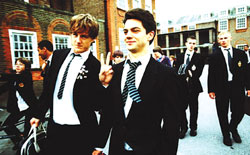 After moderate success on Broadway, Nicholas Hytner, director of Alan Bennett's witty play about middle-class ambitions in '80s Britain, quickly shot The History Boys for screen. The boys in question are eight brilliant overachievers at a grammar school. The school authorities see the boys' zesty self-assurance as an opportunity to break into the Oxford/Cambridge arena. What ensues is an epigrammatic debate over how this can be achieved and what wisdom means.
After moderate success on Broadway, Nicholas Hytner, director of Alan Bennett's witty play about middle-class ambitions in '80s Britain, quickly shot The History Boys for screen. The boys in question are eight brilliant overachievers at a grammar school. The school authorities see the boys' zesty self-assurance as an opportunity to break into the Oxford/Cambridge arena. What ensues is an epigrammatic debate over how this can be achieved and what wisdom means.
Irwin (Moore), the young history tutor who represents the highflying pragmatism of Thatcherite England, impresses the boys with his glib quips and expedient methods of approaching historical topics. Interesting interpretations are more important to him than truth. Opposed to this pedagogy is the aged and adored general-studies teacher, the ultimate hero of the story, Hector (Griffiths).
Hector's anti-utilitarian and humanistic passion for knowledge is formidable, despite (or perhaps because of, as Hector would argue) his fondness for pop culture and his students' crotches. The tussle between the two philosophies animates this story about learning with great vigour.
The film was made with the original cast, and the actors embody the characters with categorical exuberance. Richard Griffiths, who has received multiple awards for the role, plays Hector with a masterful balance of humour and sorrow. Also notable are Dominic Cooper as Dakin, the cocky seducer, Samuel Barnett as Posner who is desperately in love with Dakin, and Frances de la Tour as Dorothy, the jaded matron of this academic world.
For better or for worse, The History Boys is rooted in its theatrical past. Dialogue rules the film, and there is no room for inarticulacy or dullness among the barrage of words. Hytner's application of stage contrivance to the film is effective in emphasising the artificial and performative aspect of formal education. On the downside, the scenes appear over-prepared yet limited cinematically. Partial attempts at making the screen adaptation more realistic appear misguided. And the editing compliments neither the mercurial pace nor the shifting moods of the drama.
Still, the film offers glimmering entertainment and, staying true to Bennett's writing, also asks rich questions about education. The distinctions between profound knowledge and pop culture, between high language and plain talk, are blatantly diminished. And Bennett's buffeting of account book pedagogy impresses with remarkable wit.
Director: Nicholas Hytner.
Cast: Richard Griffiths, Stephen Campbell Moore, Samuel Barnett, Dominic Cooper, Frances de la Tour.
2006. R. 104 min.


